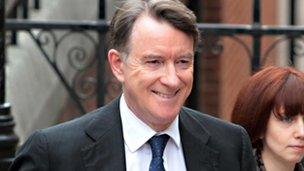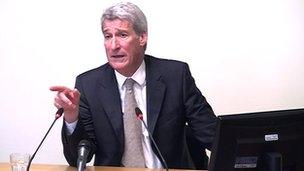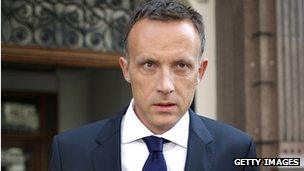Leveson Inquiry: Summary of week 21
- Published

Lord Mandelson said there was "no Faustian pact" between Labour and News International
The focus of much of the Leveson Inquiry this week switched away from phone hacking and towards the recent row involving Culture Secretary Jeremy Hunt.
But Court 73 also saw appearances from several Labour Party big-hitters - and two of the men used to grilling them.
On Monday, <link> <caption> former business secretary Lord Mandelson told the inquiry</caption> <url href="http://www.bbc.co.uk/news/uk-18144135" platform="highweb"/> </link> there was no "Faustian pact" between Labour and Rupert Murdoch's News International before the 1997 general election.
But he said it was "arguably the case... that personal relationships between Mr Blair, [Gordon] Brown and Rupert Murdoch became closer than was wise".
Earlier on Monday former culture secretary Tessa Jowell told Lord Justice Leveson having her phone hacked made her feel she was going "slightly mad".
On Tuesday, <link> <caption>former home secretary Alan Johnson told the inquiry</caption> <url href="http://www.bbc.co.uk/news/uk-18157231" platform="highweb"/> </link> he regretted not ordering an independent inquiry into Scotland Yard's handling of the phone-hacking scandal.
He also revealed how on first meeting Rebekah Brooks, he called her "Rachel" by mistake.
Also on Tuesday, Tom Watson MP - a dogged pursuer of News International over phone hacking - told the inquiry that a Sun journalist had warned him in 2006 that then-editor Mrs Brooks would "never forgive" him for calling on Tony Blair to resign.

Jeremy Paxman said Piers Morgan explained how to access phone messages
On Wednesday, <link> <caption>BBC Newsnight presenter Jeremy Paxman made headlines when he told the inquiry</caption> <url href="http://www.bbc.co.uk/news/uk-18173185" platform="highweb"/> </link> that then-editor of the Daily Mirror Piers Morgan explained to him at a lunch 10 years ago how to hack mobile phones.
Mr Morgan, who denies phone hacking, later Tweeted: "That's the last time I'm inviting Jeremy Paxman to lunch. Ungrateful little wretch."
Earlier, fellow BBC presenter Andrew Marr said that without a little "wining and dining" between journalists and politicians, the public would not have known about the difficulties within the relationship between Tony Blair and Gordon Brown.
On Thursday, <link> <caption>the inquiry heard from Jeremy Hunt's former special adviser Adam Smith,</caption> <url href="http://www.bbc.co.uk/news/uk-18187228" platform="highweb"/> </link> who quit last month after saying his emails to and from News Corp lobbyist Fred Michel over the firm's bid to take over BSkyB went too far.
During his evidence, details were read of a memo that Jeremy Hunt sent to David Cameron voicing support for News Corp's bid to take over BSkyB before he was put in charge of dealing with it.
In it, Mr Hunt said the UK's media sector "would suffer for years" if the deal was blocked.
Mr Michel also appeared before the inquiry on Thursday. He insisted his dealings with Mr Smith were not "inappropriate" and he did not have "any direct conversation" with Mr Hunt relating to the BSkyB bid beyond his attendance at two formal meetings.

Mr Michel's witness statement confirmed he and Jeremy Hunt exchanged numerous text messages
<link> <caption>His witness statement confirmed</caption> <url href="http://www.levesoninquiry.org.uk/wp-content/uploads/2012/04/Witness-Statement-of-Frederic-Michel1.pdf" platform="highweb"/> </link> the men had exchanged numerous text messages, in which Mr Hunt addressed the lobbyist as "mon ami", and Mr Michel praised Mr Hunt's "stamina" and "great" performances on TV and in the Commons.
But after Mr Hunt was handed responsibility for the BSkyB bid in December 2010, the culture secretary said in a text that all business contact "now needs to be through official channels until decision made".
<link> <caption>Mr Smith continued his evidence on Friday,</caption> <url href="http://www.bbc.co.uk/news/uk-18202042" platform="highweb"/> </link> telling the inquiry he had been "bombarded" with information from Mr Michel during the bid process and while departmental officials knew of their contact, "I don't think they knew of the volume or extent".
He said he would use his "judgement on what to say and what not to say", but admitted he regretted some of his texts.
Also on Friday, the most senior civil servant in the culture department, Jonathan Stephens, told the inquiry that Mr Hunt's main aim was to "reach a fair and unbiased decision" on the News Corp bid.
Jeremy Hunt himself will give evidence on Thursday 31 May.